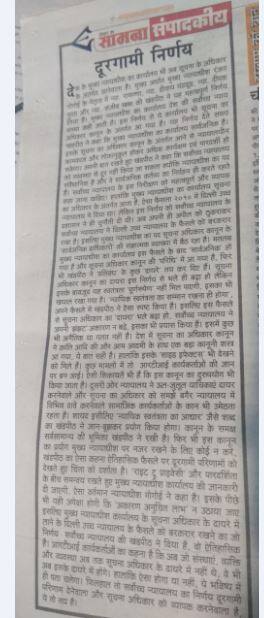Shiv Sena welcomes SC ruling to bring CJI office under RTI, calls it 'historic'
Hailing the top court, the Saamana article also pointed out that Justice Sanjiv Khanna, while reading out the majority verdict, clearly said that the public interest demands that transparency is maintained.
Trending Photos
)
MUMBAI: Uddhav Thackeray-led Shiv Sena has hailed the Supreme Court's recent decision to bring the office of the Chief Justice of India (CJI) under the ambit of the Right To Information Act (RTI), calling it a ''historic judgement.''
In an editorial in its mouthpiece Saamana, the Maharashtra-based party said, ''The five-judge Constitution Bench of Supreme Court has ruled that the office of the Chief Justice of India comes within the ambit of the Right to Information Act, 2005. This is a historic decision, which will have far-reaching consequences and bring more transparency in the Indian judiciary.''
Elaborating on the issue, the Sena editorial said that the top court's decision will further cement the credibility of the Indian judiciary. ''The order passed by a five-judge Constitution bench headed by Chief Justice Ranjan Gogoi and Justices NV Ramana, DY Chandrachud, Deepak Gupta and Sanjiv Khanna states that the office of the Chief Justice of India is a public authority under the Right to Information Act,'' the editorial said.
Hailing the top court, the Saamana article also pointed out that Justice Sanjiv Khanna, while reading out the majority verdict, clearly said that the public interest demands that transparency is maintained.
''The Supreme Court's decision comes with certain conditions so as to prevent the misuse of the right to freedom of expression given to the citizens of India by the Constitution,'' it added.

'Citing the ruling, the Sena editorial said, ''Maintaining that the judicial independence and accountability go hand in hand, the bench said, ''When the public interest demands the disclosure of information, judicial independence has to be kept in mind while deciding the question of exercise of discretion.”
''This has been done to maintain a thin balance between the Right to Privacy and transparency and to ensure that no one takes undue advantage of the freedom guaranteed by the Constitution,'' the Sena editorial further explains.
Calling the top court's decision ''historic'', the Saamana editorial concluded by saying that it will have far-reaching consequences and further strengthen the Right To Information Act.
It may be recalled that the Supreme Court on Wednesday ruled that the office of the Chief Justice of India fell within the ambit of the Right to Information Act, 2005.
A five-judge constitution bench had on April 4 reserved its verdict on the appeals filed in 2010 by the Supreme Court secretary-general and its central public information officer against the high court and the central information commission's (CIC's) orders.
In a landmark verdict on January 10, 2010, the Delhi High Court had held that the office of the chief justice of India comes within the ambit of the Right to Information (RTI) law, saying judicial independence was not a judge's privilege, but a responsibility cast upon him.
The 88-page judgment was then seen as a personal setback to the then CJI, KG Balakrishnan, who has been opposed to disclosure of information relating to judges under the RTI Act.
The high court verdict was delivered by a three-judge bench comprising Chief Justice A P Shah (since retired) and Justices Vikramjit Sen and S Muralidhar. The bench had dismissed a plea of the Supreme Court that contended bringing the CJI's office within the RTI Act would "hamper" judicial independence. Justice Sen retired as the judge of the apex court, while Justice Murlidhar is a sitting judge of the high court.
The move to bring the office of the CJI under the transparency law was initiated by RTI activist SC Agrawal. His lawyer Prashant Bhushan had submitted in the top court that though the apex court should not have been judging its own cause, it is hearing the appeals due to "doctrine of necessity".
(With Agency inputs)
Live Tv







)
)
)
)
)
)
)
)
)
)
